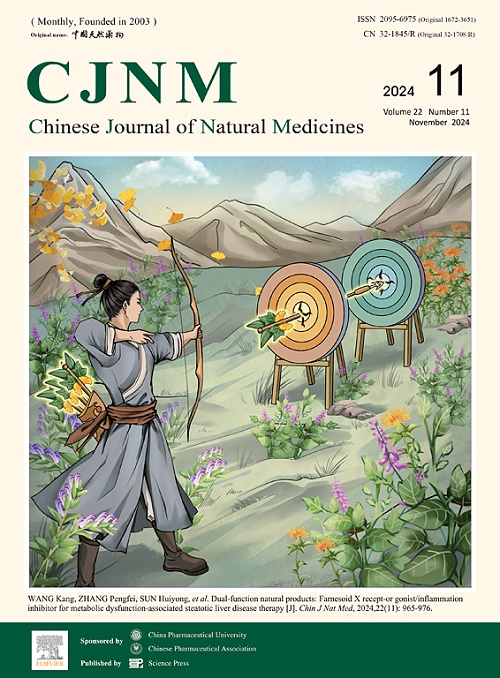通过抑制PRMT1介导的EGFR甲基化阻碍天冬苷I的多药耐药逆转作用
IF 4.9
2区 医学
Q1 INTEGRATIVE & COMPLEMENTARY MEDICINE
引用次数: 0
摘要
肿瘤多药耐药(MDR)损害了多种化疗药物的治疗效果。迫切需要新方法,特别是开发耐多药逆转剂来应对这一挑战。本研究表明,从马蹄草(Marsdenia tenacissima, Roxb.)中分离得到的一种化合物tenacisso苷I (TI)具有一定的活性。Wight et Arn,传统上作为民族药用于临床治疗癌症,在abcb1介导的MDR癌细胞中显示出显著的MDR逆转作用。TI通过下调ABCB1表达和降低ABCB1药物转运功能,逆转了SW620/AD300和KBV200细胞对阿霉素(DOX)和紫杉醇(PAC)的耐药。机制上,蛋白精氨酸甲基转移酶1 (PRMT1)在ti处理的SW620/AD300细胞中存在差异表达,其表达与预后不良相关,与肿瘤组织中ABCB1和EGFR表达均呈正相关。与亲本细胞相比,SW620/AD300和KBV200细胞表现出EGFR不对称二甲基精氨酸(aDMA)水平升高,PRMT1-EGFR相互作用增强。此外,ti诱导的PRMT1下调损害了SW620/AD300和KBV200细胞中PRMT1介导的EGFR aDMA、PRMT1-EGFR相互作用和EGFR下游信号。这些影响被PRMT1过表达显著逆转。此外,TI在异种移植模型中显示对PAC的抗性逆转,没有可检测到的毒性。本研究通过抑制prmt1介导的EGFR aDMA,确立了TI对abcb1介导的MDR人癌细胞的MDR逆转作用,提示TI作为MDR调节剂改善化疗结果的潜力。本文章由计算机程序翻译,如有差异,请以英文原文为准。
Multidrug resistance reversal effect of tenacissoside I through impeding EGFR methylation mediated by PRMT1 inhibition
Cancer multidrug resistance (MDR) impairs the therapeutic efficacy of various chemotherapeutics. Novel approaches, particularly the development of MDR reversal agents, are critically needed to address this challenge. This study demonstrates that tenacissoside I (TI), a compound isolated from Marsdenia tenacissima (Roxb.) Wight et Arn, traditionally used in clinical practice as an ethnic medicine for cancer treatment, exhibits significant MDR reversal effects in ABCB1-mediated MDR cancer cells. TI reversed the resistance of SW620/AD300 and KBV200 cells to doxorubicin (DOX) and paclitaxel (PAC) by downregulating ABCB1 expression and reducing ABCB1 drug transport function. Mechanistically, protein arginine methyltransferase 1 (PRMT1), whose expression correlates with poor prognosis and shows positive association with both ABCB1 and EGFR expressions in tumor tissues, was differentially expressed in TI-treated SW620/AD300 cells. SW620/AD300 and KBV200 cells exhibited elevated levels of EGFR asymmetric dimethylarginine (aDMA) and enhanced PRMT1-EGFR interaction compared to their parental cells. Moreover, TI-induced PRMT1 downregulation impaired PRMT1-mediated aDMA of EGFR, PRMT1-EGFR interaction, and EGFR downstream signaling in SW620/AD300 and KBV200 cells. These effects were significantly reversed by PRMT1 overexpression. Additionally, TI demonstrated resistance reversal to PAC in xenograft models without detectable toxicities. This study establishes TI’s MDR reversal effect in ABCB1-mediated MDR human cancer cells through inhibition of PRMT1-mediated aDMA of EGFR, suggesting TI’s potential as an MDR modulator for improving chemotherapy outcomes.
求助全文
通过发布文献求助,成功后即可免费获取论文全文。
去求助
来源期刊

Chinese Journal of Natural Medicines
INTEGRATIVE & COMPLEMENTARY MEDICINE-PHARMACOLOGY & PHARMACY
CiteScore
7.50
自引率
4.30%
发文量
2235
期刊介绍:
The Chinese Journal of Natural Medicines (CJNM), founded and sponsored in May 2003 by China Pharmaceutical University and the Chinese Pharmaceutical Association, is devoted to communication among pharmaceutical and medical scientists interested in the advancement of Traditional Chinese Medicines (TCM). CJNM publishes articles relating to a broad spectrum of bioactive natural products, leading compounds and medicines derived from Traditional Chinese Medicines (TCM).
Topics covered by the journal are: Resources of Traditional Chinese Medicines; Interaction and complexity of prescription; Natural Products Chemistry (including structure modification, semi-and total synthesis, bio-transformation); Pharmacology of natural products and prescription (including pharmacokinetics and toxicology); Pharmaceutics and Analytical Methods of natural products.
 求助内容:
求助内容: 应助结果提醒方式:
应助结果提醒方式:


